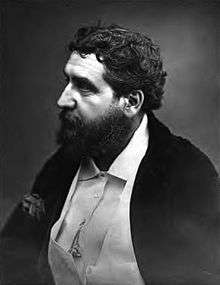Mortimer Collins
Edward James Mortimer Collins (29 June 1827 – 28 July 1876) was an English poet and novelist.
Mortimer Collins | |
|---|---|
 | |
| Born | 29 June 1827 Plymouth |
| Died | 28 July 1876 (aged 49) Berkshire |
| Signature | |
Biography
He was born at Plymouth, where his father, Francis Collins, was a solicitor. He was educated at a private school, and after some years spent as mathematical master at Elizabeth College, Guernsey, he relocated to London. In London, Collins devoted himself to journalism in the Conservative Party interest, writing largely for periodicals. He also wrote occasional and humorous verse, and several novels. Soon after his second marriage, to Frances Collins in 1868, he settled at Knowl Hill, Berkshire and from this time he rarely left his home for a day and published several novels.
In 1855, he published his Idyls and Rhymes; and in 1865 his first story, Who is the Heir? was published. A second volume of lyrics, The Inn of Strange Meetings, was issued in 1871; and in 1872 he produced his longest and best sustained poem, The British Birds, a communication from the Ghost of Aristophanes. He also wrote several novels, including Sweet Anne Page (1868), Two Plunges for a Pearl (1872), "Miranda" (1873), Mr. Carrington (1873) (under the name of "R. T. Cotton"), Squire Silchester's Whim (1873, set in Devon), Sweet and Twenty (1875),[1] and A Fight with Fortune (1876). His three-volume novel Transmigration (1873) is "a fantasy of multiple incarnations of which the middle one is set on a utopian Mars...."[2]
Some of his lyrics, with their "light grace, their sparkling wit and their airy philosophy", were argued by the 1911 Encyclopædia Britannica to be "equal to anything of their kind in modern English".[3]
Collins is credited by the New English Dictionary with introducing the word "psithurism" to the English language: derived from the Ancient Greek for "whisper," it was applied specifically to the whispering of the wind. This was noted (inaccurately) by The Guardian newspaper in an editorial of 30 September 1909 - reprinted on 30 September 2006 but not available online.
Notes
- XIX Century Fiction. Part I: A–K. Jarndyce Bloomsbury, 2019.
- George Locke, "Wells in Three Volumes? A Sketch of British Publishing in the 19th Century," Science Fiction Studies, Vol. 3 No. 3 (November 1976), pp. 282-6; see p. 283.
- . Encyclopædia Britannica. 6 (11th ed.). 1911. p. 692.
| Wikisource has original works written by or about: Mortimer Collins |
| Wikiquote has quotations related to: Mortimer Collins |
References


External links
- Works by or about Mortimer Collins at Internet Archive
- Works by Mortimer Collins at LibriVox (public domain audiobooks)

- Archival material at Leeds University Library